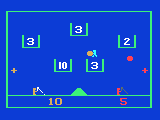This game is based (somewhat loosely) on the popular Japanese slot-machine-like gambling games. In Pachinko, you control a man armed with an "energizer" -- a hockey-stick-shaped electrical rod. Two such men are stationed at the bottom of the screen on the left and right sides, respectively. Hit one of the two pachinko balls with the energizer, and the ball becomes the color of your man and takes off. If the ball goes in a cup, the point value of that cup is added to your score.
Like a real pachinko machine, scoring big in this game is almost entirely based on chance. You have a bit of control over where you hit the ball, but none over where it ultimately goes. Spinning rotors can knock your balls in random directions (ouch!). The Troubleshooter, a blue man in the center of the playfield, grabs your balls (double ouch!) and tosses them around haphazardly. Ironically, your greatest measure of control comes from another random element: the Magic Mountain. When struck by a ball, this pyramid at the bottom of the screen randomly shuffles the point values of the cups. If you're quick, you can hit the Magic Mountain until the high-point cups are on your side of the playfield, which gives you a slightly better chance of hitting them. But even then, you'll have to be lucky.
Pachinko's best feature is that either or both of the on-screen players can be human- or computer-controlled. And, because random chance is such a factor, there's not much difference between playing against the computer or playing a friend (although going head-to-head with a friend is always more fun). You can even let the computer take over both players if you just feel like watching -- and really, what could be more exciting than sitting front-row at a pachinko match? The game goes on forever; whoever first achieves an agreed-upon score is considered the winner.
Looking back, pachinko is an odd choice for a classic video game system. I can't imagine the American or European public clamoring for a home video version of a Japanese gambling machine in 1980. To my knowledge, no other video game versions of pachinko (outside of Japan) have ever been released. This makes the O2 version a novelty, to say the least. The video game's cheery sounds and bright colors capture the garishness of real pachinko quite well, and there's something unexpectedly fun about it, once you accept that you don't have a lot of control over the outcome. Konichiwa!

 SENDING...
SENDING...